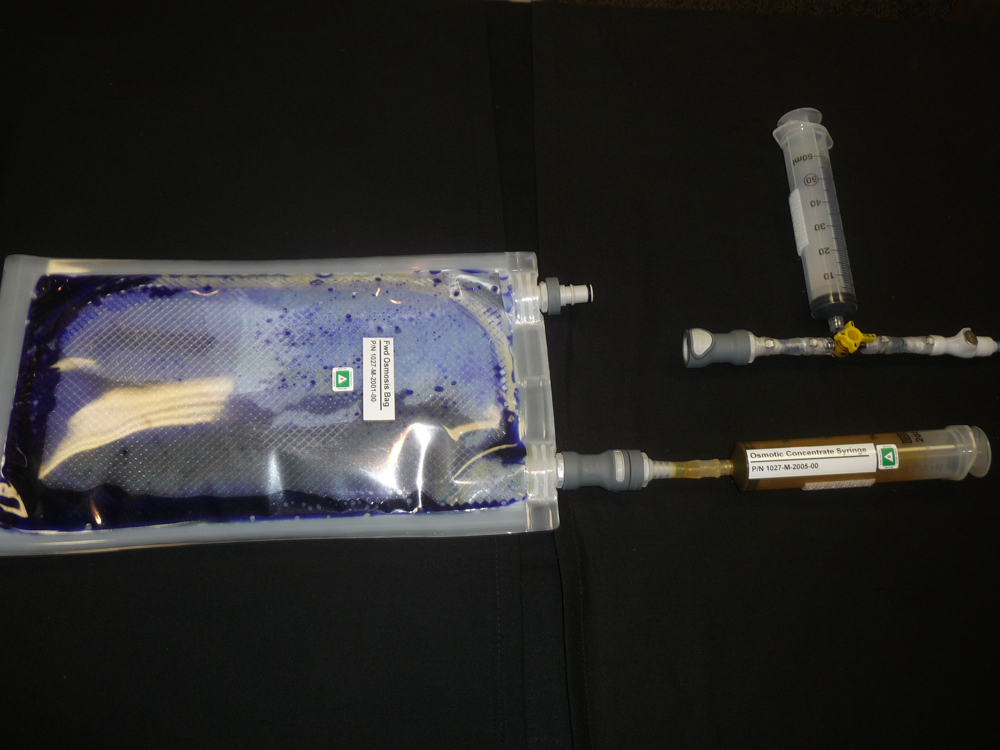
One of the last experiments ever performed on a space shuttle may one day help develop an efficient way to convert astronauts' urine into drinking water.
The shuttle Atlantis is carrying the experiment on its STS-135 mission — the last in the shuttle program's storied history — which landed early Thursday morning (July 21). During their last hours in space, Atlantis' crew is testing how an established, self-contained water-filtration system works in microgravity, in the hopes that astronauts can use the technology on future space missions.
The filtration tech, known as the Forward Osmosis Bag (FOB) system, could end up purifying sweat, urine and all sorts of other impure liquids. But it's not envisioned to be a primary provider of spaceflyers' drinking water, at least not in the near future.
"This could be used in an emergency situation," Howard Levine, FOB project scientist at NASA's Kennedy Space Center, told reporters during a demonstration at KSC just before Atlantis' July 8 launch. "It could also be used in the future as part of an EVA — Extra-vehicular Activity — suit." [Video: What the Space Shuttle Did for You]
Forward osmosis: the basics
The system consists of a bag, about the size of a hot-water bottle, with two chambers separated by a semi-permeable membrane. A sugary syrup is injected into the inner chamber, while the impure liquid is introduced into the outer one.
Pure water passes across the membrane into the inner chamber via a process known as forward osmosis. The stuff in the inner chamber then becomes very drinkable; Levine compared it to a sports drink like Gatorade.
Get the Space.com Newsletter
Breaking space news, the latest updates on rocket launches, skywatching events and more!
The technology, created by scientists at NASA's Ames Research Center in Moffett Field, Calif., works well on Earth. A single bag can purify about one quart of water in four to six hours, Levine said, and can be used up to 40 times, ultimately yielding about 10 gallons of potable water.
A company called Hydration Technologies has commercialized the filtration system, and the United States Department of Defense hands its own modified version out to some of its soldiers for use in the field.
But scientists don't yet know how well the membrane system will work in microgravity, so the STS-135 crew is testing it out.
"That's the main purpose of what we're trying to do," Levine said.
Testing it out on Atlantis
Atlantis carried six of the filtration bags. Astronaut Rex Walheim was slated to perform the experiment Tuesday (July 19), using a potassium chloride solution as the impure liquid, researchers said.
Nobody drank the purified liquid in space. Instead, the astronauts planned to bring the bags down with them, Levine said. [Space Shuttle's Legacy: More Tech Spinoffs Than Apollo]
If the membrane works well aboard the shuttle, a full-on urine-filtering system could be ready to go after another year or two of development, Levine said. That would probably involve adding a charcoal filtration component to the current set-up, which still lets enough kidney-damaging urea through that purified urine is only safe to drink in small doses.
The International Space Station already has a urine-recycling system for astronauts to use. But the $250 million recycler chews up a lot of precious power, while any forward-osmosis method would work passively, researchers said.
You can follow SPACE.com senior writer Mike Wall on Twitter: @michaeldwall. Visit SPACE.com for complete coverage of Atlantis' final mission STS-135 or follow us @Spacedotcom and on Facebook.
Join our Space Forums to keep talking space on the latest missions, night sky and more! And if you have a news tip, correction or comment, let us know at: community@space.com.

Michael Wall is a Senior Space Writer with Space.com and joined the team in 2010. He primarily covers exoplanets, spaceflight and military space, but has been known to dabble in the space art beat. His book about the search for alien life, "Out There," was published on Nov. 13, 2018. Before becoming a science writer, Michael worked as a herpetologist and wildlife biologist. He has a Ph.D. in evolutionary biology from the University of Sydney, Australia, a bachelor's degree from the University of Arizona, and a graduate certificate in science writing from the University of California, Santa Cruz. To find out what his latest project is, you can follow Michael on Twitter.










